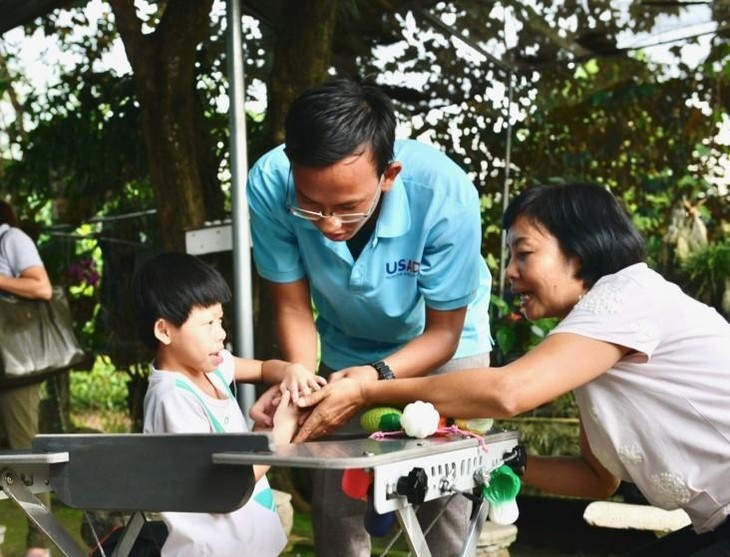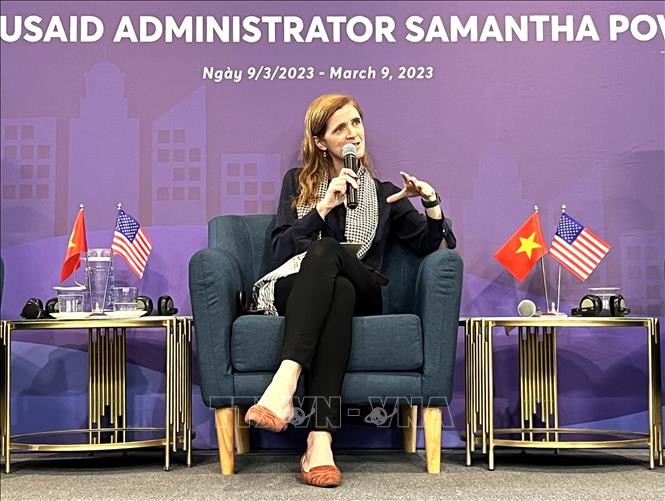(VOVWORLD) - A project to improve the lives of people with disabilities in provinces heavily affected by Agent Orange/dioxin has been effectively implemented in Binh Phuoc province, a locality that has suffered the consequences of landmines, unexploded ordnances, and Agent Orange since the war. The project is funded by the United States Agency for International Development (USAID) Vietnam.
 USAID offers rehabilitation services for people with disabilities in Binh Phuoc province. (Photo: Thac Phuong) USAID offers rehabilitation services for people with disabilities in Binh Phuoc province. (Photo: Thac Phuong)
|
Pham Thi Minh Tam, who has suffered from ocular atrophy and cerebral palsy since birth, has lived an isolated life for many years. She depends on her mother and other relatives to help her do everything.
Like Minh Tam, 80-year-old Bui Thi Thom is completely dependent on her relatives. She hasn’t been able to walk on her own for many years.
Both of them have received support from the project to improve the lives of people with disabilities in provinces heavily affected by Agent Orange/dioxin. Both have been examined and treated by doctors and technicians of the Rehabilitation Department of the Binh Phuoc provincial General Hospital to improve their speech and motor skills.
“The rehabilitation has helped Tam make progress. She has learned to comb her hair, tie up her hair, brush her teeth, and wash her face. I’m very happy to see her to do that,” said Tam’s mother.
80-year old Ms Thom said with the help of the doctor for 2 months, she has improved the ability, and now she can use a wheelchair to get around.
In addition to physical therapy at the hospital, doctors and therapists also come to the patients' homes to provide treatment.
Medical technician Tran Thi Quy of Binh Phuoc provincial General Hospital said she found the project very useful and practical, adding, “It helps people with disabilities a lot.”
To expand medical support and rehabilitation services, the project has raised community awareness of people with disabilities and AO/dioxin victims and promoted clubs for disabled people.
The USAID has provided equipment to the Binh Phuoc Traditional Medicine Hospital. Nguyen Thi Hoa, a nurse at the Binh Phuoc Traditional Medicine Hospital, said, “The traditional medicine hospital has been equipped with many modern machines for rehabilitation.”
Thanks to the project, 280 people have received medical treatment. 97% of them have improved their physical functions.
Nguyen Duy Thach, the hospital’s Deputy Director, said the first phase of the USAID-funded project has trained medical workers to perform medical exams and treat people with disabilities.
“Binh Phuoc has deployed medical clinics and multi-function therapy clinics, offering mobility, speech, and physical therapy. A unified examination system has been set up in the locality. A majority of the patients have made progress that will help them integrate into the community,” Thach noted.
 USAID Administrator Samantha Power (Photo: VNA) USAID Administrator Samantha Power (Photo: VNA)
|
The USAID project has now been expanded to 7 other provinces and cities including Quang Tri, Thua Thien-Hue, Quang Nam, and Dong Nai. It is one of the USAID's longest-term programs and is the broadest support for disabled people that the USAID has provided Vietnam.
Since 1989, 1 million people with disabilities have benefited from the program, which has a total funding of more than 140 million USD.
The program has become an important part of Vietnam-US cooperation, and a foundation for building trust, overcoming the past, and developing a stronger relationship in the future.
During her visit to Vietnam in March, USAID Director General Samantha Power insisted that over the past decade, the relationship between the United States and Vietnam has blossomed into a deep partnership.
“And as we continue our essential work together - to grapple with a changing climate, to safeguard global health, to provide relevant opportunities to young people, and to strive economic growth, I know that the next 10 years are going to usher in and even stronger partnership, driving progress and prosperity for the people of Vietnam,” said Samantha.